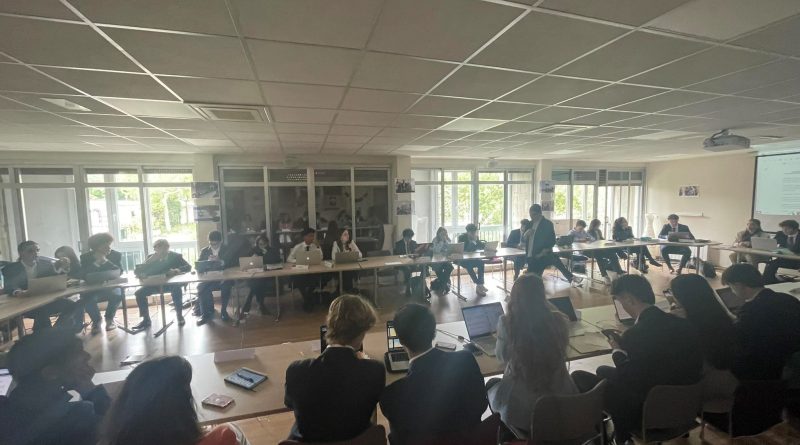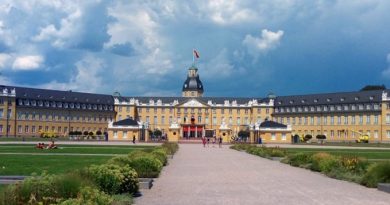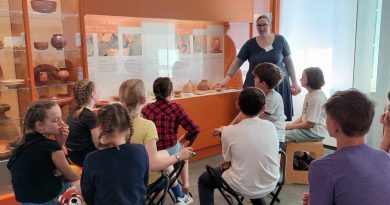The progress of the EUROmad 2024 debates (2 days, 4 committees)
The EUROmad conference models the debates going on at the EU. It had two days of debates with 9 committees, each with one representative of each European country, and, in some committees, representatives of “guest” countries like Egypt or Israel. Each committee goes through a text with proposals for new laws and projects. Delegates debate each article of the document accurately representing their country’s politics, propose amendments and vote. Lobbyists work on behalf of individuals or companies and make presentations before the debate, trying to influence the opinion of delegates. The school journalists are either assigned to a committee, having to write articles about it, or go from one committee to another, filming the events and making edits which are then presented at the closing ceremony. As an external journalist, I visited four different committees, which I will now present.
EUROmed committee
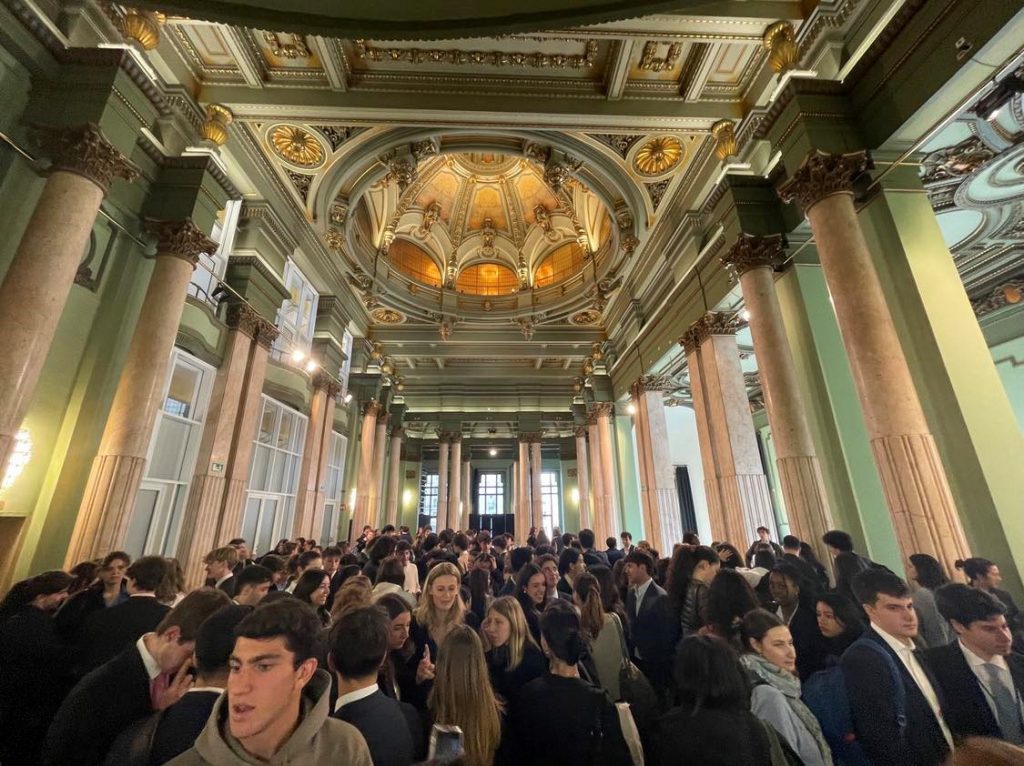
The Euromed committee operates in French, its goal is for European countries to collaborate with countries from around the Mediterranean and from the Middle East. This committee has therefore some delegates representing countries outside the EU, mostly Middle Eastern ones who are involved in this topic. Before the debate, I watched the lobbyists present the organization that they work for to the delegates, which helps Middle Eastern refugees safely arrive to and settle in Europe. They explained how crucial it is to help these people and encouraged European countries’ representatives to take a similar approach to these issues.
The committee debates terrorism and conflicts happening in the Middle East, and the EU’s approach to them. The first proposition in this section has been to make a database containing information about immigrants belonging to terrorist organizations such as Daesh or Al Qaeda to track their activity. Two amendments have been discussed: one proposed to add Hamas and Hezbollah to the terrorist organizations tracked, and the second suggested to track people belonging to any of the EU’s list of terrorist organizations instead of naming specific ones to track.
The declaration of an immediate cease-fire in the Israel-Palestine war has been requested in one of the articles. Delegates from most countries agreed that the war should be ended but did not want to send military support as it might endanger Europe. The country that entirely opposed this was Israel. It believes that Hamas is a national security risk for them, and that the war can only end once the organization is liquidated. The rest of the countries voted for an amendment to work for the end of this war only by sending humanitarian aid to Gaza and by supporting a cease-fire without sending military support to either side.

In every committee, at one point during the debates, an expert of the given topic gives a presentation. In the Euromed committee, this was the French political scientist Olivier Roy through a zoom call. He described the complexity of collaborating with the Middle East while their political standpoints and interests often contradict those of Europe. He also spoke about Europe’s approaches to Middle Eastern immigrants and the importance of this inflow of third country nationals for the European economy. He explained that there is a circuit of migration: people from less stable countries, for example from the Middle East coming to Europe seeking political stability, and Europeans leaving the continent to retire in Morocco, Tunisia, or other countries that send their people to Europe. This has been an interesting and relevant lecture, showing how complex it is to collaborate with the Middle East.
Europe for peace
Europe for Peace is a bilingual committee, and its goal is to achieve world peace. The committee itself is not the most peaceful one, most members were quite active and loud. Before the debate started, the presidents of the committee decided to engage the members of this committee by making the five latecomers perform an improvised theater piece, where the characters discuss their love lives and the fact that one of them is pregnant. These breaks got everyone to laugh and to get closer to each other and made the committee one of the braver and louder ones.
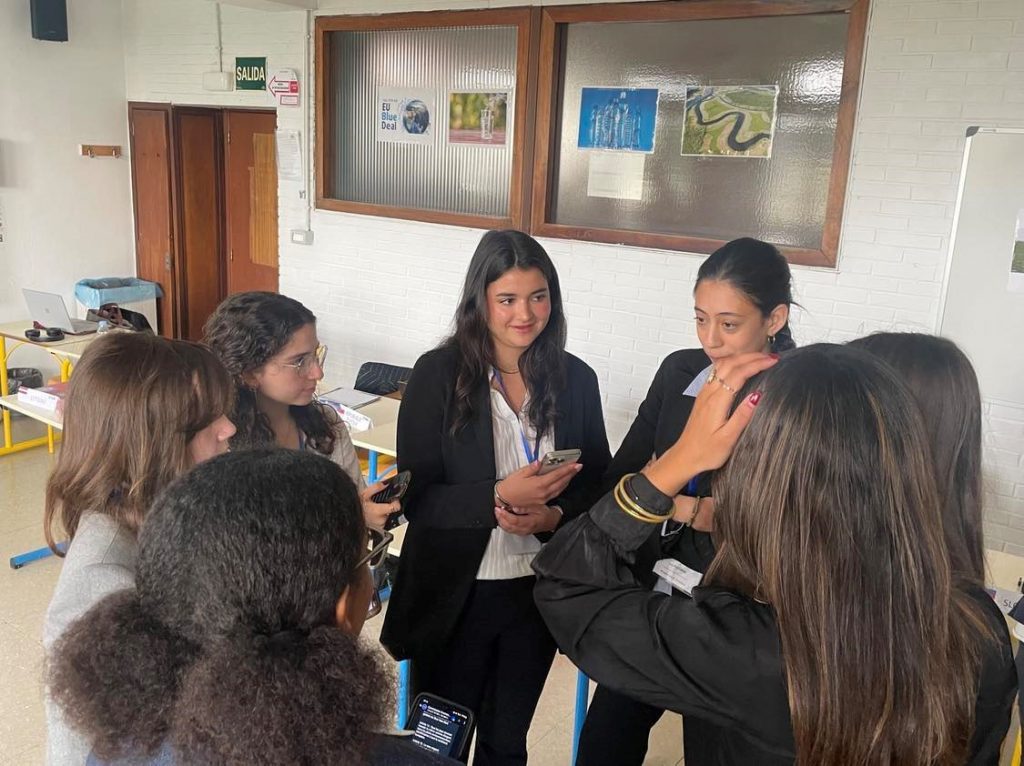
In the debate, they were discussing the Israeli-Palestinian conflict, which is a crucial issue to be solved to achieve world peace. The school’s press team announced breaking news about a political event related to the committee’s topic. They presented a short article, according to which Hamas committed cybercrimes against Israel. After the announcement, the committee discussed whether Europe should engage in the conflict. The proposition was to not get involved, countries stated their opinions, and tried to get as many others as they could to vote in the same way. The Netherlands for example agreed with the proposition, provided that no EU member state gets attacked. Many Eastern European countries signed an amendment to support cybersecurity in Israel and Europe, so that the danger of cybercrimes decreases. The Netherlands proposed a solution to split the funding equally between the two sides of the conflict, while France suggested that the money should be spent on imprisoning Hamas members and on humanitarian aid to the victims of the war. The Netherlands reminded France that the issue being discussed is cybersecurity and asked it to stop bringing up past articles. The amendment proposing to fund cybersecurity has been adopted.
The next issue discussed was a system of sharing information and coordinating diplomacy, by creating a common database for the member states of the EU. An amendment was proposed, adding that this system is only instated when the war in Israel is over, because, as discussed, Hamas is committing cybercrimes and could leak information and use it against the EU. Hungary was against both the article and the amendment, saying it will make it easier for Europe’s enemies to hack into the EU database, even after the war. This time, France and the Netherlands were on the same page, saying they could secure the database more if it was one united system, and that it is crucial for the Union to work together for it to be united. The amendment was passed; the common database will be set up after the war.
The next few articles passed without long negotiations, they were about training people and strengthening our defenses against cybercrimes. Then, a debate started about reinforcing the connection between the EU and other organizations like NATO and the United Nations. An amendment was proposed, suggesting maintaining independence from these organizations while collaborating with them. This passed, and the committee got close to finishing the entire document.
New Blue Deal
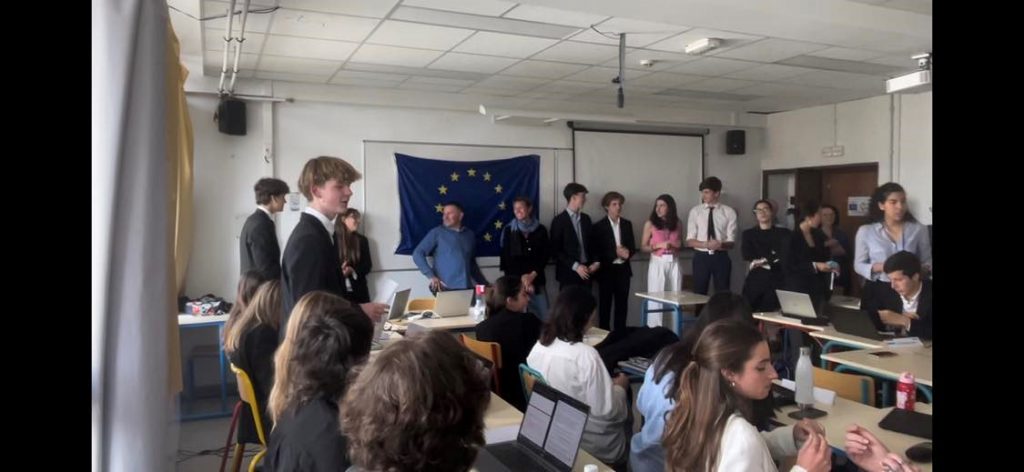
The committee for the Environment debated the allocation of water with a plan for water management and drought resistance: the New Blue Deal. Its implementation in Europe and the Mediterranean area, which is most affected by droughts, was discussed. This committee has been more chaotic than the others: the presidents and lobbyists talked to each other while the delegates were debating, they draw and wrote funny comments on the whiteboard. I only visited this committee for a brief time, but it was still interesting to experience this.
The committee for the environment debated the financing of the New Blue Deal. This is a controversial topic, because even though water management is important for all countries, it is difficult to find room for it in the budget. Denmark and Czechia proposed for countries to invest 1.5% of their GDP in the financing of the Blue Deal, but some countries like Poland disagreed, saying there are bigger issues to solve first, like poverty. The next article proposed political and economic sanctions for those countries that do not invest in the New Blue Deal. Belgium proposed an amendment, which would remove political sanctions from the article, so that not investing in the Blue Deal only leads to economic sanctions. They argued that it is not the EU’s job to influence the politics of other countries, economic sanctions are more straightforward and easier to enforce. The amendment passed after only a short debate. Then, the next proposition has been that large enterprises should help to finance the Blue Deal. France proposed for the SUEZ group to finance it, but the amendment has not been accepted, most countries do not think one company should be put in charge of all the finances. Romania proposed that 50% of large enterprises should finance 75% of the Blue Deal’s expenses. This amendment was accepted, as it was less radical than making enterprises or one enterprise cover all the finances, but it still ensures a large contribution from the private sector.
Court de justice
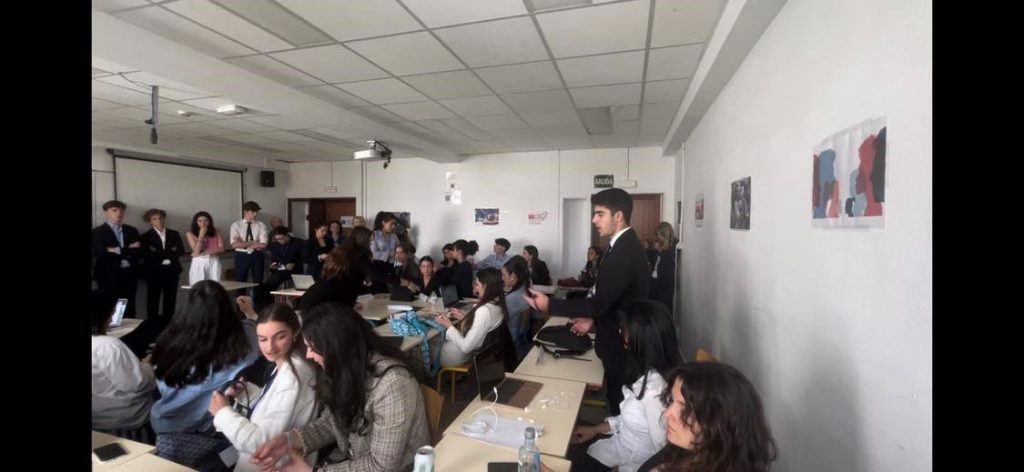
The Court de Justice is the only English committee in the EUROmad, and it aims to reach equality and the respect of human rights everywhere. I visited this committee towards the end of the conference when it had already passed numerous articles, for example, it legalized gay marriage in all EU member states.
The last section left for debate was about education. The original proposal has been about the importance of an inclusive curriculum for schools, where teachers respect the diversity of students, avoid stereotyping, and teach about LGBTQ+, ethnic and religious minorities, and disabled people. An amendment to this section was proposed by Poland, to shorten the proposals into one article. This focused on the support of LGBTQ+ students and proposed that all children should get educated about this topic before the age of 16. For this section amendment to pass, all countries had to agree. The delegates were tired, it was easier to convince them about topics their country would not normally agree with. I believe this debate would have lasted much longer if it had not been held during the last few hours of the conference. Most of the participants, even those representing conservative, Eastern European countries, would personally agree that people should be educated about LGBTQ+ rights, and therefore with the amendment, so the delegates of these countries had a hard job arguing for something they disagree with. Even though they knew their country would disagree with this amendment, accepting it was their best option: there were too many countries agreeing with LGBTQ+ rights to pass any amendment that is less tolerant. All knew that this was the best compromise that they could get, as it urges countries to educate about LGBTQ+, but not to young children, so the amendment passed.
When the debates were over, teachers came to evaluate each committee. The delegates had 30 minutes to informally discuss the things they agreed on and to write a summary, then five of them selected randomly had to present these. The teachers asked questions about the proposals, which these five people answered. This was the end of the work in the committees. Afterwards, all that was left was the party and the closing ceremony.
The four committees I saw all had productive debates. It would be interesting to see what the world would be like if it were led by these delegates. It was visible that they all put an enormous amount of effort into preparing for and participating in these debates and learned a lot about the politics of the world right now. We could also see how much the organizer students worked on setting up the debates, and how well they executed this conference. All our school’s students did an excellent job, we congratulate them all and especially those who got appointed the best delegate of their committee: Pierre Speight (Tourism) and Antoni Narozny (Court de Justice). I believe we can now all look forward to next year’s conference.
Léna Csigo / S5HUB / EEB1 Uccle

